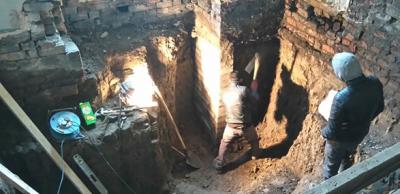How to get it right: Building control exemptions (or when you DON'T need building regulations approval)
While we love to be involved, there are times when you won’t need a Building Regulations application. Whether you are carrying out building work yourself, or employing a builder, there are a number of building regulations exemptions to both work and buildings that don't need building control approval.
The following is intended as a guide but you should always check with your local LABC team if you're in any doubt or need clarification. You can also view Planning Portal’s interactive guides for more information.
Remember, these exemptions only relate to building control applications and you may need to apply for planning permission separately, particularly if you live in, or are carrying out work, to a property that is listed or within a conservation area.
Work that does not need building control approval
- Maintenance work
- Minor repairs
- Replacing less than 25 per cent of an item, like-for-like
- Additional power or lighting points and switches (except around baths and showers)
- Alterations to existing circuits (except around baths and showers)
- Like-for-like replacements of baths, toilets, basins or sinks
- Boundary or garden walls, fences and gates
- In some cases, works that are being carried out by competent registered persons (check details for this with your local LABC team)
Buildings that do not need building control approval
- Greenhouses (providing they are not used for retail, packing or exhibiting)
- Some agricultural buildings (check with your local LABC team)
- Temporary buildings (erected for less than 28 days)
- Some ancillary buildings such as estate sales buildings and building site offices without sleeping accommodation
- Some small detached buildings (check with your local LABC team)
- Buildings that are not frequented by people (check with your local LABC team)
- Detached single storey buildings, including garages, that are less than 30m2 floor area and contain no sleeping accommodation, and are at least one metre from any boundary or constructed of non-combustible materials
- Detached single storey buildings that are less than 15m2 floor area
- An extension to a building at ground level consisting of a porch of less than 30m2 floor area and separated from the house by an external type door
- A carport open on at least two sides
- A covered yard or covered way less than 30m2
- A conservatory or porch that is less than 30m2, with a significant proportion of the roof and walls glazed (no % given), it must be at ground level, it must comply with relevant sections of Part K (glazing), be thermally separated from the dwelling by external quality windows and/or doors and the buildings heating system must not be extended into the conservatory or porch.
- Crown property
- Buildings subject to the Explosives Act
- Buildings other than houses or offices erected on a site licensed under the Nuclear Installations Act
- Buildings included in the Schedule to Section 1 of the Ancients Monuments and Archaeological Areas Act
Don’t forget that you might still need approval for any enabling works. For example creating a wider opening into an exempt conservatory would still need approval for the structural alteration to widen the opening.
Further information
For further guidance on getting building control approval visit the Planning Portal’s free guide.
Please Note: Every care was taken to ensure the information was correct at the time of publication. Any written guidance provided does not replace the user’s professional judgement. It is the responsibility of the dutyholder or person carrying out the work to ensure compliance with relevant building regulations or applicable technical standards.
Sign up to the building bulletin newsletter
Over 48,000 construction professionals have already signed up for the LABC Building Bulletin.
Join them and receive useful tips, practical technical information and industry news by email once every 6 weeks.
Subscribe to the Building Bulletin





Comments
Reply
Submitted 4 years 8 months ago
As it's within one metre of the boundary you will need building regulations approval.
Kind regards
Julie, LABC
Garage
Submitted 4 years 8 months ago
1930's house rerendering
Submitted 4 years 8 months ago
Reply
Submitted 4 years 8 months ago
Thanks for getting in touch with LABC.
Whether you are removing existing render and re-rendering or applying a render finish to a previously un-rendered surface, the requirement to improve the performance of the “thermal element” depends on the extent of the works. It sounds like you are rendering the whole property, if this is the case, then the works should incorporate insulation, in order to achieve a maximum area-weighted U value of 0.30/m2k. The same would apply if you were rendering at least 25% of the overall wall surface area and technically where more than 50% of any particular elevation is being rendered. If the wall is cavity construction and it is suitable to do so, you may be able to insert cavity wall insulation, this would need to achieve a maximum area-weighted U value of 0.55/m2k.
You are advised to discuss specific project details with your local authority building control team use the postcode search to find their contact details. Always ensure you employ contractors who are specialists, since poorly executed installations can create defects in relation to damp penetration and mould growth, which can be costly to remedy.
I trust you find this response useful.
Regards
Richard, LABC
Hot tub shelter
Submitted 4 years 8 months ago
Lean to precast concrete sectional garage
Submitted 4 years 7 months ago
Reply
Submitted 4 years 7 months ago
To be exempt from control under the building regulations, the 'lean to' must be open on at least two sides and have a floor area not exceeding 30m2. A concrete sectional garage attached to a dwelling would require approval under the building regulations.
Kind regards
Barry, LABC
Solid roof conservatory
Submitted 4 years 7 months ago
it will be under 30m2 floor area,
Ground level
Eves less than 3m high,
External patio doors to remain in place to separate the room,
Solid brick wall to one side and 2 sides of glazing.
Velux window in pitched roof.
Pitched roof less than 4m in height.
Electric radiator for heating with a separate cut off switch from the main building.
No water or gas.
It is intended to be used as a part time office as I now have to work from home.
Does this meet the criteria to be exempt from building regs?
Exempt buildings floor area definition
Submitted 4 years 7 months ago
Reply
Submitted 4 years 6 months ago
Floor area is typically measured internally for the purposes of the Building Regulations, so having thicker walls would not be an issue. Planning on the other hand is likely to consider external dimensions, but this is something you would need to check with your local authority planning section. I hope this response helps.
Kind regards
Richard, LABC
Ychwanegu sylw newydd